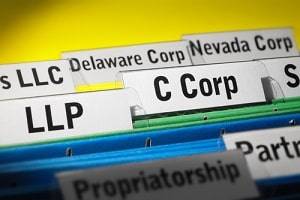Anyone who is starting a business will need to select a business entity or model with which they will follow. A corporation and limited liability company (LLC) are two different types of business entities that both offer their own benefits. Depending on how you would like ownership, taxation, and management to look for your business, you can select a business entity that reflects these professional goals. You may have an idea of how you want your business to run, but may not be sure which business entity this aligns with. Before deciding upon your business entity, speak with a reputable business attorney for advice on how to proceed with your business.
Business Ownership
If you are beginning your business with a few investors or partners in mind, you should understand how corporations and LLCs differ in this regard. In corporations, the ownership of the business is divided by shares of stock purchased by owners, known as shareholders whereas LLCs’ owners are called “members.” These shareholders can determine how much ownership they would prefer to have by purchasing additional shares to own a larger percentage of the company or selling their shares if they wish to reduce their ownership amount. Corporations are a good option for those who are seeking outside investors.
LLCs do not look at ownership through the same financial lenses. LLCs can have as many owners as they want and their financial contribution does not have to determine their “level” of ownership. Instead, many LLCs will use operating agreements to specify how much ownership each member has — this can be equal ownership between members or varying for each member.
Taxation
How the two entities are taxed can be confusing and should be thoroughly discussed with a business attorney; however, there are some general guidelines that new business owners can understand. Corporations are taxed as a separate entity, which can earn their own income. As a result, they are responsible for paying taxes as well, which can lead to “double taxation” where a corporation pays its own taxes and the owners also pay taxes. Fortunately, qualifying corporations can opt for an S-corp status to avoid double-taxation.
In contrast, LLCs are pass-through entities since the profits of the business are “passed through” to the individual members who report the income on their personal tax returns. The LLC owners report their earnings and losses on their personal tax returns, rather than their business ones, and any operating costs or losses can be deducted. However, if LLCs want to be taxed as a corporation, the members can also opt for an S-corp tax status. Your business attorney will work closely with your accountant to see which tax status is most suitable for your business.
Management
A corporation’s management structure is more complicated than that of an LLC’s. Corporations are owned by shareholders, who elect a Board of (BoD), which in turn, appoints the officers. The BoD manages the corporation’s management and the officers are assigned specific duties and control the corporation’s day-to-day activities. In contrast, LLCs have a simpler structure where either the owners (“members”) can directly manage the company or simply hire a manager to manage the daily activities, which allows the business to be managed by all or some of its members. The LLC’s structure should be outlined in its operating agreement to avoid confusion on which members also act as managers, if applicable.
Contact an Oak Brook Business Formation Lawyer
It is important to determine which business entity your business will follow before opening. Without this determination made, your ownership and management can quickly go awry and you may have difficulties when filing for taxes. Making this decision from the beginning can help you properly organize any business contracts and operating agreements with current and future owners. Shakfeh Law LLC works with companies of all entities and sizes, helping them discern which entity best suits their needs and goals as a new business or an existing business. Attorney Danya Shakfeh has over a decade of experience working with business owners, and as a business owner herself, she understands how impactful these decisions are. For help with your business, contact our DuPage County business attorney today at 630-517-5529 to schedule your consultation.


